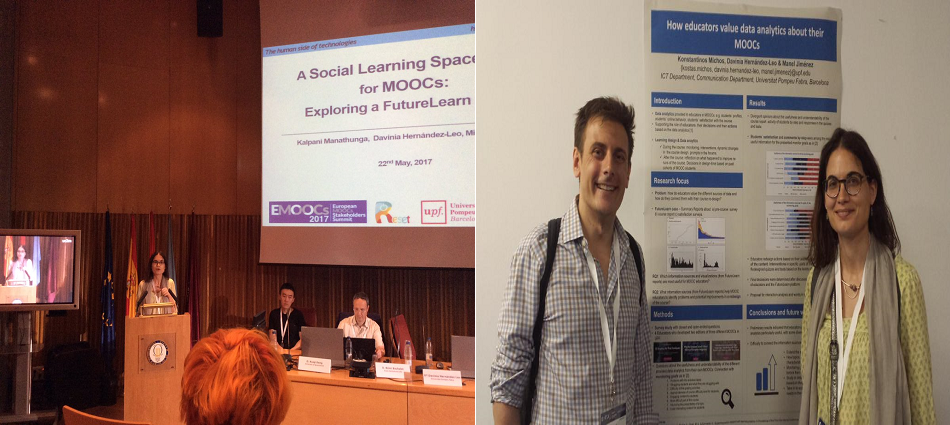Participation in EMOOCs 2017
Participation in EMOOCs 2017

We have participated in 5th European MOOCs Stakeholders Summit (EMOOCS 2017) held in Madrid, Spain from 22nd to 26th May, 2017. Davinia Hernández-Leo presented a paper, co-authored with Kalpani Manathunga and Mike Sharples, on “A Social Learning Space Grid for MOOCs: Exploring a FutureLearn Case” in the main conference, where she also participated in the poster session demonstrating work with Konstantinos Michos and Manel Jiménez titled, “How educators value data analytics about their MOOCs“. Following are synopsis of the two publications.
- Manathunga, K., Hernández-Leo, D., Sharples, M., (2017) A Social Learning Space Grid for MOOCs: Exploring a FutureLearn Case, Springer LNCS (vol. 10254) Proceedings of eMOOCs 2017, Madrid, Spain, 243-253.
Abstract : Collaborative and social engagement promote active learning through knowledge intensive interactions. Massive Open Online Courses (MOOCs) are dynamic and diversified learning spaces with varying factors like flexible time frames, student count, demographics requiring higher engagement and motivation to continue learning and for designers to implement novel pedagogies including collaborative learning activities. This paper looks into available and potential collaborative and social learning spaces within MOOCs and proposes a social learning space grid that can aid MOOC designers to implement such spaces, considering the related requirements. Furthermore, it describes a MOOC case study incorporating three collaborative and social learning spaces and discusses challenges faced. Interesting lessons learned from the case give an insight on which spaces to be implemented and the scenarios and factors to be considered.
- Michos, K., Hernández-Leo, D., Jiménez, M., (2017) How educators value data analytics about their MOOCs, CEUR Proceedings of Work in Progress Papers of the Experience and Research Tracks and Position Papers of the Policy Track at EMOOCs 2017 co-located with the EMOOCs 2017 Conference (Vol-1841), Madrid, Spain, 77-82.
Abstract : A range of data analytics is provided to educators about the profile, behavior and satisfaction of students participating in a Massive Open Online Course (MOOC). However, limited research has been conducted on how this informs the redesign of next MOOC editions. This work-in-progress paper presents a study of 4 MOOC educators from Universitat Pompeu Fabra regarding 3 MOOCs offered on the FutureLearn platform. The objective was to evaluate the usefulness and understandability of different types of data analytics of the courses they have offered with respect to specific monitoring goals. Preliminary results show that educators perceived the same information sources and data visualizations differently, satisfaction surveys and comments in the forum were among the most useful information but it was difficult to associate data analytics with the monitoring goals. Further studies for the alignment of educators´ monitoring needs for redesign purposes and the development of appropriate support tools are suggested.
